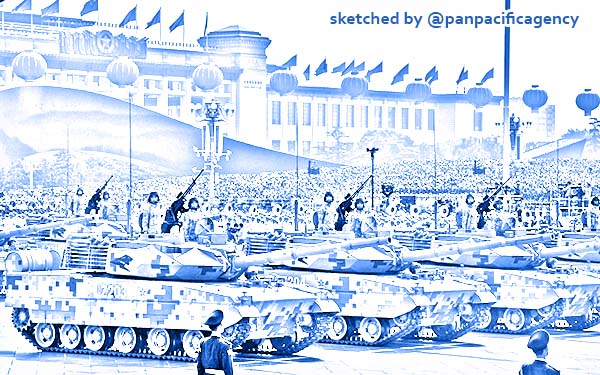Focus on US as main opponent: China’s military strategist

BEIJING, CHINA - OCTOBER 01: Chinese soldiers sit atop tanks as they drive in a parade to celebrate the 70th Anniversary of the founding of the People's Republic of China in 1949, at Tiananmen Square on October 1, 2019 in Beijing, China. (Photo by Kevin Frayer/Getty Images). Sketched by the Pan Pacific Agency.
BEIJING, May 29, 2020, SCMP. China needs to pick its battles wisely and concentrate on its main opponent the United States, according to a prominent Chinese military strategist, widely credited with shaping the Trump administration’s hawkish views against Beijing, South CHina Morning Post reported.
Retired air force major general Qiao Liang said Washington’s open contest with Beijing to contain China’s rise had attracted other parties – including advocates for independence in Taiwan – to join the attack, but he advised the Chinese leadership to avoid being distracted and focus on the main adversary.
“When you are facing off a gang in a fight, you must first bring down the biggest guy and other opponents will be intimidated,” Qiao wrote, in one of two articles published within days of each other on Chinese social media platform WeChat.
Qiao said that, as long as Taipei made no real move to declare independence, there were more pressing issues facing Beijing. “We need to prioritise in the face of this formidable opponent … we should not distract ourselves by tackling weaker opponents for self-consolation.”
Qiao is best known as the co-author of 1999 book Unrestricted Warfare, which discussed US vulnerabilities and suggested non-military ways that superpowers could be defeated. The book prompted former adviser to US President Donald Trump Steve Bannon and others to determine that Beijing was waging “economic warfare” against the US.
In his latest articles – which coincided with the annual meeting of China’s legislature, the National People’s Congress – Qiao said Beijing should try to neutralise any attempt by the US to contain China’s advancement as a manufacturer. “Arm-wrestling with the US is the least wanted but most urgent business we have to do now,” he said.
Qiao said Washington had taken a number of key steps in preparation for an eventual full confrontation with Beijing. These included starting the trade war, going after technology giant Huawei, suppressing China’s hi-tech industries, decoupling the two economies, blaming China for the new coronavirus pandemic, and demanding compensation for its effects.
Qiao also listed US support for separatists in Taiwan, Hong Kong, Xinjiang and Tibet as part of the groundwork being laid by Washington in readiness for the predicted confrontation.
Beijing should seize the limited time window available to prepare itself by focusing on reducing reliance on raw material imports and boosting the domestic market for Chinese-made goods, in a bid to neutralise the US effort, he said.
While the disparate groups advocating for Taiwan independence should be a lower priority for Beijing, Qiao said Hong Kong had become a key battlefield between the US and China, following the Trump administration’s decision to inform Congress on Wednesday that it no longer considered the city autonomous from the mainland.
The White House move was prompted by Beijing’s decision to bypass the city’s legislature and impose a national security law – described as “inevitable and necessary” by Qiao in a phone interview with the South China Morning Post.
“It’s not just a local issue of Hong Kong but is also tied to the contest between China and the US. Hong Kong is now the frontier of the contest … and a key battlefield for China to fend off US suppression,” he said.
“[Washington’s decision] will have a serious impact on Hong Kong for a considerable time. But the city’s future is also affected by China’s power, attitude and ability to handle Hong Kong issues. If China can withstand the US’ comprehensive suppressions, Hong Kong will withstand them too. After all, it is all about the China-US contest.”
Hong Kong democrats bash national security law from China’s two sessions, US also voices concern
Qiao’s assessment of the current state of relations between Beijing and Washington was echoed in the Great Hall of the People, where official remarks during the “two sessions” legislature assembly meetings revealed a growing sense of risk.
In a rare direct manner, defence minister General Wei Fenghe said, during a panel discussion, that “the Sino-US strategic confrontation has entered a period of high risk”.
Chinese President Xi Jinping also used panel discussions during the assembly to warn about the impacts of the global recession and rising geopolitical risks to China in the wake of the new coronavirus pandemic.
Xi said China would pursue a new development model in which the domestic market “plays the dominant role”, pivoting away from export-led growth.
Meanwhile, the national security law for Hong Kong received a keen response from legislators in Beijing, in contrast to the reappearance of anti-government street protests in the city.
Additional reporting by Minnie Chan